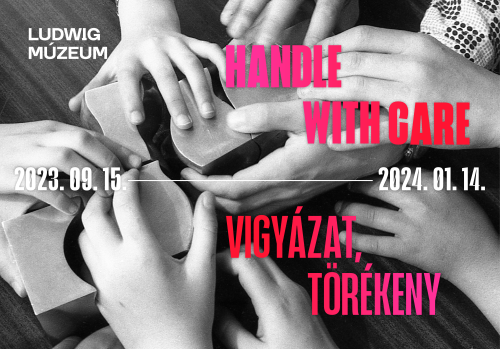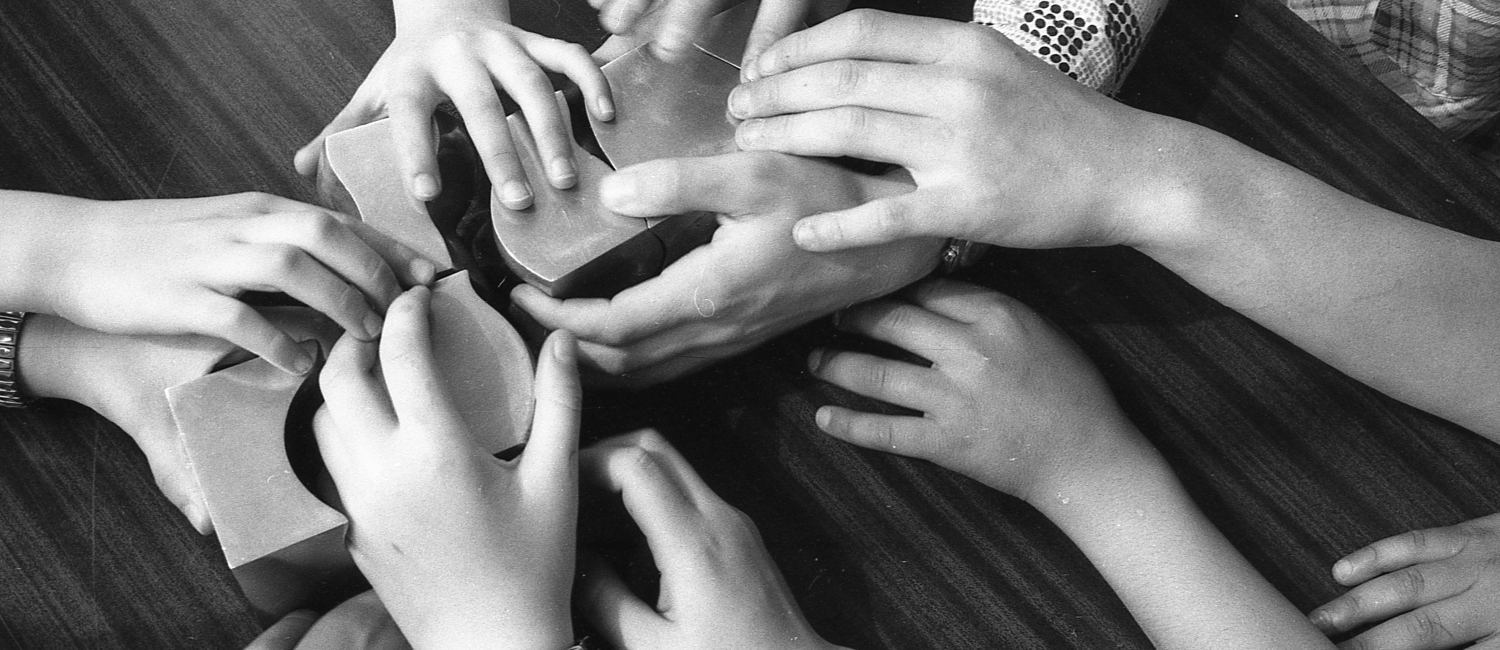The Symposium entitled “Caring Practices” is the closing event of the Ludwig Museum’s exhibition Handle with Care, which aims to discuss its findings, results, possibilities for further development, and to present the experiences and concepts of Hungarian and international experts on the topic.
Just as the exhibition is a collaboration between a curator, art historian (Viktória Popovics) and a museum educator, visual artist (Rita Dabi-Farkas), the aim of the professional session is to bring together different knowledges, experiences and perspectives. One of the innovations implemented in the exhibition – and a problem to be raised at the symposium – is the use of Easy Language in the exhibition space, which allows textual information to be accessible to a wider audience.
Another important issue raised by the symposium is the inclusion of disabled, handicapped and marginalised groups in museums and the issue of social responsibility of cultural institutions. How can social issues be brought up by means of visual arts, and how can the issues raised be used to create an inclusive museum environment and improve programmes? In addition to formulating dilemmas, difficulties, gaps (and shortcomings), we would like to present forward-looking efforts, already implemented programmes, models and good practices, and to make the idea of the caring museum an object of common reflection. Elke Krasny, curator, theorist, professor at the Academy of Fine Arts in Vienna, author of numerous books and publications, including Curating with Care (London: Routledge, 2023), will be one of the symposium’s invited speakers.
The symposium will include short lectures on theoretical and practical aspects, followed by workshops where participants will learn practical methods and techniques.
The Symposium is organised by Dabi-Farkas Rita and Popovics Viktória.
9.00–9.45 | Registration and guided tour through the exhibition Handle with Care
10.00–10.30 | Elke Krasny: “Care: On Freedom and Violence”
The social fabric of existence is woven by care. But how is care actually being cared for? And who cares for care, politically, socially, epistemically? How is care understood as knowledge? And how does knowing our relations to the world change if knowing starts from the relations of care? In the name of care, nation states have promoted the colonial supremacist project of patriarchy. In the name of freedom, so-called second wave feminism identified caring labors as burden hindering women’s creativity, intellectual productivity, and economic mobility. Tracing how modern ontologies of gender were linked to mammalian epistemologies and their political economy of care essentialism, this lecture asks what it would take to free care from the patriarchal violence of domination and extraction. This lecture asks if we can learn to imagine care otherwise and looks at activism, art, and theory providing hope, resistance, and endurance to collectively imagine and practice the freedom to care.
Elke Krasny, PhD, professor at the Academy of Fine Arts Vienna. Krasny focuses on concerns of care, reproductive labor, social and environmental justice, commemorative practices and transnational feminisms in architecture, infrastructures, urbanism, and the arts. Krasny was a fellow at the CCA Canadian Centre for Architecture. Her curatorial work on Hands-on Urbanism was shown at the 2012 Venice Biennale for Architecture. Together with Angelika Fitz she edited Critical Care. Architecture and Urbanism for a Broken Planet (MIT Press, 2019). Together with Lara Perry she edited Curating as Feminist Organizing (Routledge 2023) and Curating with Care (Routledge 2023). Her book Living with an Infected Planet. Covid-19 Feminism and the Global Frontline of Care (transcript publishers, 2023) focuses on militarized care essentialism and feminist recovery plans in pandemic times. Together with Urska Jurman, Krasny convenes the group Ecologies of Care focusing on public space, colonial and contaminated heritage, infrastructures under pressure, and new imaginaries of environmental rights. www.elkekrasny.at
10.30–10.45 | Magdalena Kallenberger: “Curating a Collective Body – A Non-idealized Version of Care”
The presentation focuses on MATERNAL FANTASIES, a feminist art collective based in Berlin, and how it strives to create reciprocal care. I will outline how the collective has established a radical art practice to resist persisting forms of structural discrimination by what they have come to call the ‘rotational work/care model’. I will further layout tools and methods developed by MATERNAL FANTASIES to integrate their children into the artistic process. What started out as a practical necessity has opened up new potentialities on how to build/curate a collective body based on a non-idealized version of care. I will demonstrate how MATERNAL FANTASIES has formed a porous, collective body, built on reciprocal relations and unequal terms, and highlight how their renegotiation of multiple complexities unfold new potentialities for other (mothers*) artists and cultural producers to maintain a self-critical art/care practice.
Magdalena Kallenberger is an artist, writer, and researcher. She works with video, photography, performance, installation, and text, combining research into feminist histories and writing with autobiography, theory and performative elements. Kallenberger’s research-based and often collaborative practice investigates themes around radical care and feminist practices tackling the in/visibility of care/work and motherhood(s) not just in the Arts. Kallenberger is a Ph.D. Candidate at Bauhaus University Weimar. Her practice-based Ph.D. explores autotheory and collective art production as knowledge-building practices within the context of artistic research. Kallenberger’s recent articles and essays appeared in publications with Routledge (2023), MIT Press (2023), k-Verlag (2023), demeter press (2023) and gender(ed) thoughts (2023). She has co-edited Re-Assembling Motherhood(s): On Radical Care and Collective Art as Feminist Practices by MATERNAL FANTASIES, published with onomatopee in 2021, second edition in 2022.
10.45–11.15 | Roundtable: “Radical Caring Practices”
ELKE KRASNY (Academy of Fine Arts Vienna), MAGDALENA KALLENBERGER (MATERNAL FANTASIES, Berlin), STEPHANIE WINTER (SALON HYBRID, Vienna) Moderated by VIKTÓRIA POPOVICS
15.30–17.30 | Stephanie Winter: “SHARING SESSION”
SHARING SESSION is a format created by artist Stephanie Winter as part of her artistic practice, involving the creation of installations, laboratories, and new forms of exploration, exchange, and holistic learning together with the audience. It aims to create a safe space for peace, open a window for hopeful and visionary thoughts, and explore societal challenges through coming together, sharing ideas, potentials, and meals while delving into notions of care, activism, and togetherness. All participants are invited to bring something so that the act of caring for each other and carrying the energy of this moment of togetherness is shared by each participant. We kindly request each participant to contribute a small impulse related to the theme of care or a specific word within this context. This contribution can take the form of an object, a thought, a gesture, a song, a track, or an edible creation. This concept of a sharing ceremony is inspired by Ursula Le Guin’s ’Carrier Bag Theory,’ which emphasizes the collection not only of food but also the seeds of stories and perspectives, encouraging exchange and sharing within our circle and beyond. Please note that for our sharing sessions, we gather in a non-hierarchical manner, sitting on the floor around a low table.

Please be informed that our events will be recorded by sound and video, from which the Ludwig Museum may use details to promote the museum and its programs and for other promotional purposes. By participating in our events, you agree that you may appear on the recordings, but you may not make any claim against the use of the recording with the Ludwig Museum or third parties authorized by it.
Related content

Handle with care 15. September, 2023 – 14. January, 2024
The exhibition’s title Handle with Care refers to the vulnerability of those in need of care, the asymmetrical relationship between carer and cared for, the fragility of life and our ecosystem, and the cracks and gaps in the social care system, but most of all, it calls attention to the need for collective responsibility.
